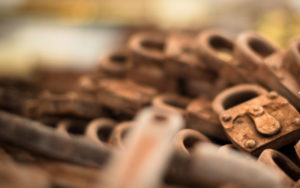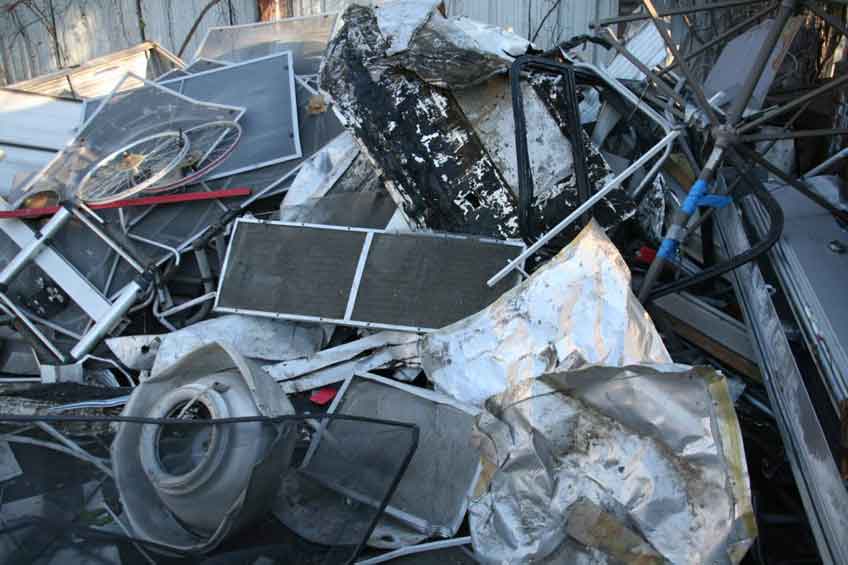Welcome to the exciting world of metal recycling! (Seriously, it’s a lot more fascinating than you might think.) As some of the world’s most recyclable materials, metals can be melted and refashioned into new products over and over again without losing strength or fidelity. And unlike plastics, they don’t have to be “downcycled” into lower-grade products to accommodate the degrading of the material—take that, plastic bottles!
Aluminum cans, in particular, are especially cost- and energy-efficient. Recycling an aluminum soda can takes just 8% of the energy required to produce a brand-new container. In fact, almost 70% of aluminum cans come from recycled materials—encouraging numbers, indeed.

Why Recycle Your Metal?
You can get a sense of why metal recycling is so important from the statistics above. But in case you need more convincing, here are a few more persuasive facts about the metal recycling business.
- Metal recycling has the potential to reduce greenhouse gases by 300 to 500 million tons.
- Recycling just one aluminum can saves enough energy to power a television for three whole hours.
- A recycled can may be back on the shelves of the grocery store in less than 60 days.
- In 2006, Americans recycled enough cars to build almost 13.5 million new ones from the ground up!
- Every year, Americans reduce their energy consumption by recycling steel—enough to power the Los Angeles skyline for almost a decade.
- But we still throw out enough steel to rebuild our entire airfleet from scratch.
The bottom line is that metal recycling is energy efficient, good for the environment and cheaper to process than new raw materials.
What Kind of Metals Can Be Recycled?
It’s not just cans that get the recycling treatment. All different types of metals—food-safe aluminum and stainless steel, commercial grade copper and steel building materials, and conductive metals like the gold and silver used in electronics—can be refashioned as brand-new products.
Of course, just because it can be recycled doesn’t mean that your local metal recycling center will take it off your hands. Your metal recycling yard probably has its own list of acceptable materials—for instance, at Gardner Metals, we take aluminum, copper, brass, stainless steel, iron, tin, and some exotic and rare metals found in electronics and building fixtures. Contact your local recycling center to obtain a list of their materials (you can find centers near you using the database on IWantToBeRecycled.org).
What Happens When Metal Is Recycled?
This is where the magic happens! Metal recycling is an involved process with quite a few steps, and the type of donation affects how we prepare the metal for resale. But most material donations go through the following stages.
- Sorting. We don’t expect our donors to know the difference between red and yellow brass. So our first job is sorting your material donations by metal and grade. We use commercial magnets to separate ferrous (iron-based) metals from other types, and high-tech sensors and other tools help us make sure we know exactly what we’re dealing with.
- Cleaning. Most donations don’t come to us in pristine condition. Therefore, we treat them to an advanced cleaning process before moving on.
- Processing. Materials are a lot easier to handle when they’re not in bulky shapes and sizes, so our next step is to shred the metals into small scraps before they head into the smelter. This also makes the metal recycling process more efficient, since it takes less energy to melt down materials with a lower surface volume.
- Melting. This step really brings out your inner Bond villain! In order to convert the metals into new products, they need to be melted down and reshaped into sheets and ingots. The shredded materials are moved into a high-temperature furnace so they can be melted down and tested for impurities.
- Solidifying. Once they’re completely melted, metals are poured out of the furnace and into molds so they can be converted into bars, ingots, rods, billets or slabs. In these shapes, they’re easier to manage during transport.
- Transportation. After cooling, the metals are shipped off to factories where they’ll be processed into new cans, cars, columns, computers or whatever else they’re destined to become!
How Much Money Can I Make Recycling Metal?
Show us the goods, and we’ll show you the money! Because market rates for different metals fluctuate, it’s hard to give you a precise estimate of what’s its worth until you turn it in. However, the going rate for common metals like iron or aluminum is a lot less than what you’ll get for commercial copper, silicon or other relatively rare materials.
Most donors find that they make the most money by donating old appliances, electronics and cars, rather than cans or other materials. If you’ve got a broken-down fridge on your hands, you’ll usually get enough back to treat yourself to a fancy dinner out, which is not bad for a bunch of junk!
Have some metal you’d like us to take off your hands? Contact the best metal recycling center near you (Gardner Metals, naturally) today for more information.

